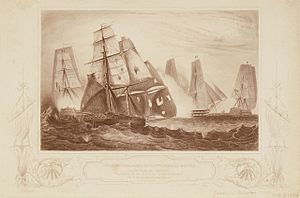French ship D'Hautpoul (1807) facts for kids
D'Hautpoul was a large French warship, known as a 74-gun ship of the line. It was launched in France on September 2, 1807. This powerful ship was originally named Alcide and then Courageux before becoming D'Hautpoul. It played a part in naval battles during the early 1800s before being captured by the British and renamed Abercrombie.

Intrepid behaviour of Captain Charles Napier, in HM 18-gun Brig Recruit for which he was appointed to the D'Hautpoul. The 74 now pouring a broadside into her. April 15, 1809. D'Hautpoul can be seen in the background.
|
|
Quick facts for kids History |
|
|---|---|
| Name | D'Hautpoul |
| Namesake | General Jean-Joseph Ange d'Hautpoul |
| Builder | Frères Crucy at Lorient shipyard |
| Laid down | June 1803 |
| Launched | 2 September 1807 |
| Completed | February 1808 |
| Captured | 17 April 1809 |
| Name | Abercrombie |
| Acquired | April 1809 |
| Honours and awards |
Naval General Service Medal with clasp "Guadaloupe" |
| Fate | Sold 1817 |
| General characteristics | |
| Class and type | Téméraire-class ship of the line |
| Displacement |
|
| Length | 55.87 metres (183.3 ft) (172 pied) |
| Beam | 14.90 metres (48 ft 11 in) |
| Draught | 7.26 metres (23.8 ft) (22 pied) |
| Propulsion | Up to 2,485 m2 (26,750 sq ft) of sails |
| Armament |
|
| Armour | Timber |
Contents
French Service of the D'Hautpoul
On February 16, 1809, Captain Amand Leduc took command of D'Hautpoul. This was the ship's first big journey. Its mission was to sail to Martinique with supplies and extra soldiers. D'Hautpoul was the lead ship of a group of three 74-gun ships and two smaller frigates.
The French squadron was led by Commodore Amable Troude. They learned that Martinique had already been captured by the British. So, Troude's ships turned back towards France. However, British ships began to chase them.
D'Hautpoul was eventually caught and captured by British ships on April 17, 1809. This happened near Puerto Rico. The British ships Pompée, Recruit, and Neptune chased the French squadron for three nights and two days. The smaller British ship Recruit managed to damage D'Hautpoul's mast, slowing it down.
This allowed Pompée to catch up and fight D'Hautpoul. After about 75 minutes of fighting, D'Hautpoul was captured. Many French sailors were killed or hurt during the battle, including some officers.
Abercrombie: British Service
After its capture, the ship was taken by the British and renamed Abercrombie. For a short time, Captain Charles Napier commanded it. He was promoted for his brave actions in helping to capture the ship. Later, Captain William Fahie, who had been ill, took over as commander.
Abercrombie helped the British capture Guadeloupe in early 1810. Years later, in 1847, the British Navy gave a special medal to all sailors who had been part of that campaign. This medal was called the Naval General Service Medal.
In February 1810, Captain Fahie was made a commodore. He was put in charge of a group of ships to help land soldiers. His squadron included Abercrombie and several other ships. They arrived at St Martin's on February 14. The combined power of the ships and soldiers forced the French and Dutch defenders to give up by February 16. A few days later, Abercrombie sailed to Saint Eustatius, and that island also quickly surrendered.
The ship then went to Plymouth for repairs, which cost a lot of money. On December 30, 1810, Abercrombie sailed to Portugal. It joined Admiral George Berkeley's squadron near Lisbon. In September 1811, while sailing with other British ships, Abercrombie captured three French trading ships. Later that year, in October, lightning struck the ship and damaged its masts.
Between 1812 and 1813, Abercrombie patrolled the English Channel. In January 1813, still under Captain Fahie's command, it recaptured a British trading ship called Industry. In July 1813, it helped capture another ship named Union. In December, it captured Marie Antoinette.
The Ship's Final Days
By May 1814, Abercrombie was no longer in active service. It was docked in the Hamoaze, a part of Plymouth harbour. The ship was sold on April 30, 1817, for £3,810.
See also
- List of ships of the line of France
 | James B. Knighten |
 | Azellia White |
 | Willa Brown |

